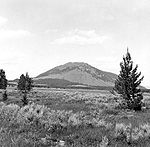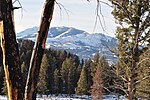Bunsen Peak
| Bunsen Peak | |
|---|---|
 Bunsen Peak from Mammoth, 2009 | |
| Highest point | |
| Elevation | 8,564[1] ft (2,610 m)[2] |
| Coordinates | 44°55′54″N 110°42′25″W / 44.93167°N 110.70694°W[2] |
| Geography | |
| Parent range | Gallatin Range |
| Topo map | Mammoth |
| Geology | |
| Mountain type | Cinder cone[3] |
Bunsen Peak el. 8,564 feet (2,610 m) is a prominent peak due south of Mammoth Hot Springs in Yellowstone National Park, Wyoming. The peak lies on the east flank of Kingman Pass on the Mammoth to Norris section of the Grand Loop Road. The peak was first ascended by Ferdinand V. Hayden and Captain John W. Barlow in 1871, Bunsen Peak was not named until 1872 during the second Hayden Geologic Survey. E. S. Topping named the peak Observation Mountain in 1872 as well, but that name did not stick.[4] The Bunsen Peak Trail with its trailhead just south of Mammoth is a steep 2.1 miles (3.4 km) to the summit.[5] Bunsen Peak was named for the German chemist Robert Bunsen, the inventor of the Bunsen Burner and responsible for early work on volcanic geyser theories.[6]
-
Bunsen Peak namesake, Robert Bunsen
-
Bunsen Peak from Swan Lake Flats, 1922
-
Bunsen Peak from Mammoth Tower Road, 2009
-
Bunsen Peak from Blacktail Deer Plateau, 2009
-
From Wraith Falls trail, 2010
See also
[edit]Notes
[edit]- ^ "More Mammoth Hot Springs Area Highlights - Yellowstone National Park (U.S. National Park Service)". www.nps.gov. Retrieved 20 April 2018.
- ^ a b "Bunsen Peak". Geographic Names Information System. United States Geological Survey, United States Department of the Interior. Retrieved 2009-12-29.
- ^ "Bunsen Peak Trail, Yellowstone National Park". The American Southwest. Retrieved 2024-09-10.
- ^ Whittlesey, Lee (1988). Yellowstone Place Names. Helena, MT: Montana Historical Society Press. p. 30. ISBN 0-917298-15-2.
- ^ Schneider, Bill (2003). Hiking Yellowstone National Park. Guilford, CT: Falcon Press. pp. 75–76. ISBN 0-7627-2539-7.
- ^ Schullery, Paul (1984). Mountain Time. New York: Nick Lyons Books. pp. 6–7. ISBN 0-8052-3932-4.







